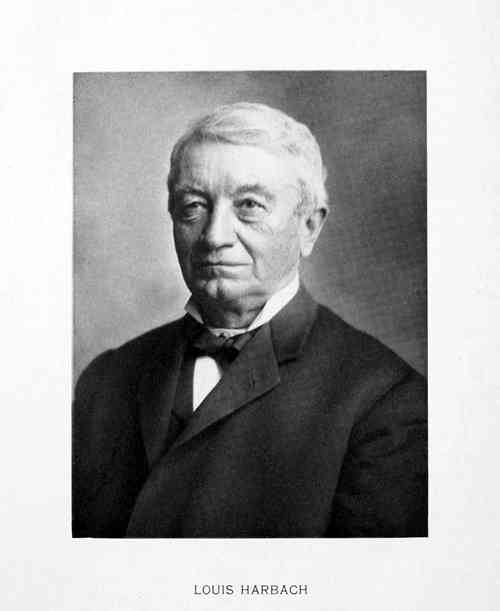IT seems almost a supererogation to mention one so well known to nearly every man, woman and child in Des Moines, in these reminiscences, as Louis Harbach, for there are very few houses or buildings in the town that have not something connected with him.
He came here in June, 1857, when only nineteen years old, with an empty purse, but abundant pluck and energy, and at once got a job at his trade as harness-maker, with W. S. Terry, I think. He worked two years at his trade. His elder brother, Christopher, had a small furniture shop on Second Street, between Court Avenue and Walnut. Louis went to Cincinnati, and learned the cabinet maker's trade, came back and joined his brother. Their shop—it had not attained the dignity of a store—was a long, narrow, loose-constructed, one-story wooden building, with unplastered walls. But two or three men were employed. There was no machinery; every article made was worked out by hand from lumber as it came from the mill. While not as elegant and recherche as can be seen in his Walnut Street house to-day, it was made to stay made. I have one of his old-time bedsteads, made of black walnut, then as plentiful as pine now is, which is as firm in its joints as when put together. But prices were pretty stiff in those days. An article which then cost twenty-five dollars can be bought of him to-day for four dollars and a half.
He at once put new life and enterprise into the concern. By indomitable energy, excellent business capacity, and strict integrity, the business increased, necessitating more space, and a four-story brick building was erected on Third Street, the first of its kind in the town, and now occupied as a Court House. It was used for retail trade, and in 1860, he brought the first lot of factory made furniture. It was shipped by steamboats from Cincinnati, and landed at 'Coon River Point.
Soon after, a large three-story brick, the first in the city for factory use, was erected on Locust Street, near the bridge, wherein all work was done by hand, until 1882, when steam power and machinery was put in. This was soon followed by a five-story brick, with stone front and basement, on Third Street, the first of its kind. It was for the wholesale trade. It is now used for the mantel and undertaking departments.
In 1866, the retail business of the city had moved westward, and trade increased beyond the capacity of the Third Street house, and another move was necessitated. A fine structure, 44x132 feet, of brick, with stone front, was erected on Walnut Street, again the first of its kind. In the meantime, the wholesale trade had out-grown its quarters, and an immense three-story warehouse and upholstery factory at Sixth Avenue and Market Street was erected.
Harbach's faith in the future growth of the city thus prompted the building of the first three, four, five, and six story business buildings therein, and set the pace for others to follow.
During all these years, he has been an extensive employer of skilled labor in the various departments of his business, often reaching a hundred and fifty men, and thus helped to build homes and add to the wealth of the community.
For several years, he was a director and stockholder of the Des Moines Savings Bank.
When the movement for securing a new Postoffice was inaugurated, he was selected by the business men of the city to negotiate the purchase of property necessary for the site, a duty requiring considerable skill and good judgment, involving a deal with a dozen different lot owners, and a public alley. He executed the task to the satisfaction of all concerned—with the possible exception of the East Siders—purchased the site for one hundred and fifty thousand dollars cash, and deeded it to Uncle Sam as a donation from the business men of the city.
During the year past, he has retired from active business, and the name which for more than forty years has been a household word in Des Moines, will pass into history, and that which has been so important a factor in the upbuilding of the town, will be put in the hands of his four sons, to the manner born, who will abandon the Walnut Street house, the retail trade, the Locust Street factory, and concentrate the business in an immense factory and warehouse at No. 100 South Fifth, a change in business affairs which grows in diversification the more it is contemplated.
Politically, Harbach is a Democrat. He has never sought nor held a public office; yet has exercised the duty of every citizen, to give his influence in favor of good government. The Church, the School, and all things that conserve to the best interest of society, have received his liberal support. Positive in temperament, reticent in speech, conservative in thought and action, an extensive property holder, prominent in business affairs, he has aided very largely in the growth and prosperity of the community.
March Fifth, 1905.
Click here for a PDF document of this biography - Easy printing and page numbers for reference.
Copyright © 1996
The IAGenWeb Project
IAGenWeb Terms, Conditions & Disclaimer


